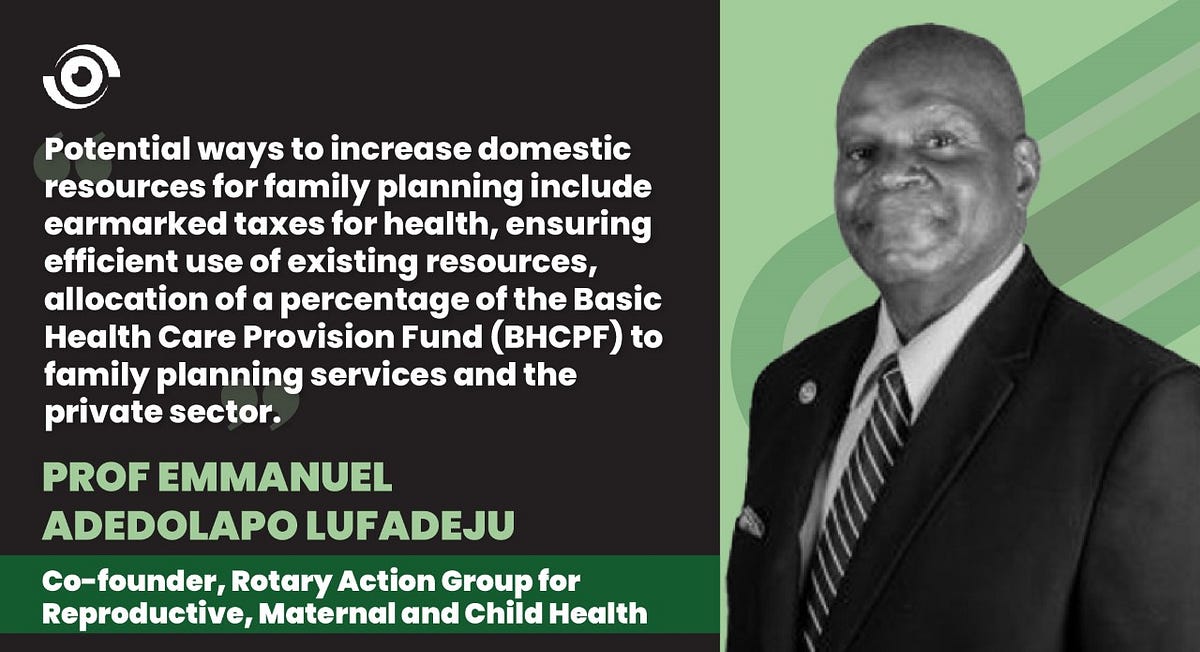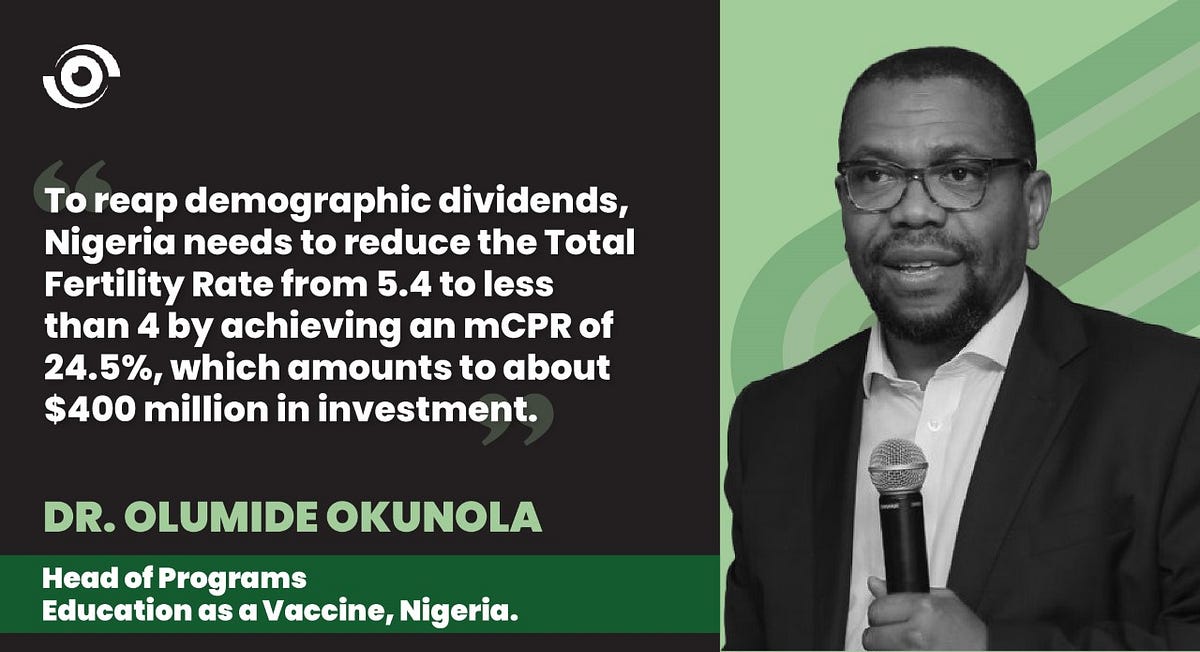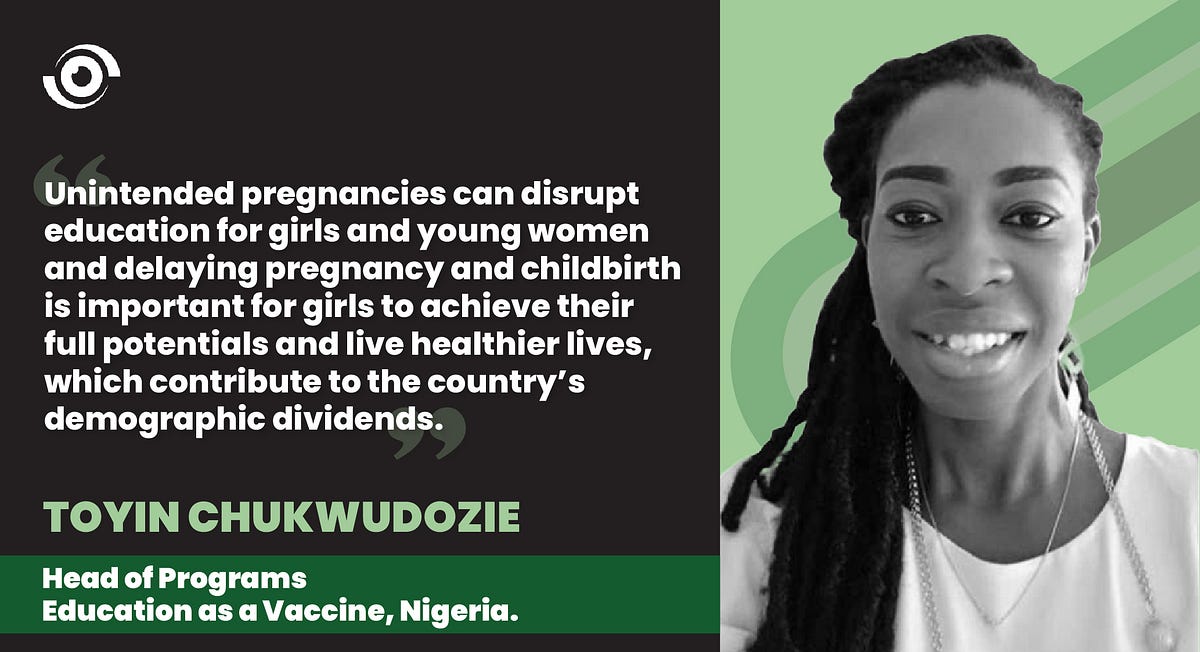Nigeria is currently the seventh most populous nation in the world. With an annual growth rate of 2.6%, Nigeria is projected to become the third most populous nation in the world by 2050, with a projected population of over 400 million. The country will not be able to meet the needs of its rapidly growing population, highlighting the importance of increasing access to family planning services and commodities.
The Nigeria Family Planning Blueprint 2020–2024 outlines the country’s plans for achieving a target modern Contraceptive Prevalence Rate (mCPR) of 27% by 2024 from its current rate of 12%, and includes a strategic objective to improve domestic funding to adequately cover family planning costs countrywide through mobilisation of resources from new public and private sector funding sources. Funding for procurement of family planning commodities is usually done through a basket fund at the National level, with the federal government and development partners contributing. However, this is inadequate to cover the unmet need for family planning services. With federal government family planning allocation cut in the 2021 budget and a recent announcement of an 85% funding cut to the United Nations Population Fund (UNFPA) by the UK government, there is an urgent need for the Nigerian government to review methods of domestic resource mobilisation and identify new or additional sources of funding for FP funding.
The #FundFPNaija Policy Dialogue
This was the theme of the 2021 Family Planning Policy Dialogue convened on 24th June 2021 and hosted by Nigeria Health Watch. Key family planning stakeholders came together to discuss ways to increase domestic resource mobilisation for family planning services in Nigeria. In his keynote speech, Prof Lufadeju, National Coordinator, Rotary Action Group for Reproductive, Maternal and Child Health, spoke on the need for family planning to become a priority for many reasons, including the demographic dividend that can be gained from Nigeria’s youthful population and the achievement of the SDGs. He also emphasised the need to explore domestic resource mobilisation, citing how allocation to counterpart funding for procurement of family planning commodities was cut from the Federal budget, and allocation to services drastically reduced by 40% in 2019. He highlighted potential ways to increase domestic resources for family planning, including earmarked taxes for health, ensuring efficient use of existing resources, allocation of a percentage of the Basic Health Care Provision Fund (BHCPF) to family planning services and the private sector. He stressed the importance of clearly communicating potential dividends of contributions by private sector stakeholders such as banking, telecommunications and the oil and gas sector. He emphasized that it is imperative to increase access to family planning services beyond health facilities, so it becomes easily accessible to women and girls outside the hospitals.

How has COVID-19 changed the Nigerian family planning services landscape?
According to Fatima B. Muhammad, Outcome Lead, LAFIYA at the Society for Family Health, the COVID-19 pandemic has had a significant impact on the ability of women to access family planning services at health facilities, given restrictions of movement and economic realities causing families to deprioritise family planning services. Toyin Chukwudozie, Head of Programs at Education as a Vaccine (EVA), highlighted the effects of reduction in family planning funding on youths, including increased unintended pregnancies, obstetric complications and maternal deaths in adolescent girls due to reduced availability of family planning commodities and services. “Unintended pregnancies can disrupt education for girls and young women, and delaying pregnancy and childbirth is important for girls to achieve their full potential and live healthier lives, which contribute to the country’s demographic dividend,” she said. Effiom Nyong Effiom, Country Director, Marie Stopes International Organisation Nigeria (MSION), highlighted how the COVID-19 pandemic had resulted in reprioritisation of funding for health, with health services, including family planning, suffering major cuts. He emphasised the need to explore funding sources, including state government allocations.
Increased access to family planning services is key to achieving demographic dividend
Dr Olumide Okunola, Senior Health Specialist at the International Finance Corporation, gave a presentation on what is needed to reap demographic dividend in Nigeria. This includes reducing the Total Fertility Rate from 5.4 to less than 4 and an mCPR of 24.5%, translating to a total cost of $400 million in investment. The need to increase revenue was highlighted, through devices like sin taxes, which are taxes on commodities like sugar, alcohol and tobacco due to their negative effects on health. These taxes should then be earmarked for health, to increase statutory transfers such as the BHCPF, and Swing Wide Votes (SWV) — which is a contingency budget used for emergencies.

Ms Ulla Mueller, Country Representative, UNFPA, spoke about how domestic resource mobilisation is key for family planning service sustainability but is not an end in itself. To achieve demographic dividend by increasing domestic resources for family planning, it is important to ensure an enabling environment, through policies, and ensure that funds are allocated, prioritised, and released. She said it would be pointless to ensure availability of family planning commodities if there is no demand.
She gave examples of other African countries and their strategies towards increasing their mCPR, including Ethiopia (like Nigeria, is also a federation with autonomous states), Senegal, Burkina Faso, and Cote D’Ivoire. Some of these countries had increased their mCPR by increasing domestic resource mobilisation, involving the private sector, rolling out policies and programs that ensured prioritisation of family planning services, and increased demand generation. She highlighted the work of UNFPA in Kano state, where they found some resistance to increased family planning services for different reasons, including religion and gender inequality, with only 11% of women reporting feeling empowered enough to make decisions on their own bodies. Advocating for an enabling environment for availability of family planning services thus required strategies targeted at addressing this resistance to increase demand generation and uptake.
Dr Ejike Oji, Chairman, Technical Management Committee, the Association for the Advancement of Family Planning (AAFP), spoke on advancements in male advocacy and ensuring increased access to family planning services, emphasising efficiency and accountability in use of available funds at both national and subnational levels. He advocated for the inclusion of family planning services in the benefit packages of health insurance schemes and the BHCPF, and targeting the right messaging on demographic dividend of family planning services and the need to ensure adequate funding.

Key recommendations to improve domestic resource mobilisation for family planning services
Several recommendations were proffered to ensure that Nigeria improves her domestic resource mobilisation for family planning services.
- Increase revenue generation and allocation of funding to health through earmarked taxes and efficient management of resources.
- Work with states to identify their priorities and ensure advocacy for family planning services fit into them to increase resource mobilisation at the state level.
- Increase private sector involvement in funding for family planning services by making a sound business case on prospective benefits, such as reduction in taxes, and reduced maternal mortality.
- Empower youth with the right information to increase demand, uptake and access to family planning services
- Increase men’s involvement in advocacy for increased access to family planning services
Vivianne Ihekweazu, Managing Director of Nigeria Health Watch, who moderated the dialogue, concluded by emphasising that for private sector, civil society organisations and development partners to work in partnership with the government to improve funding for family planning services, funds must be released and not just allocated.



All Nations should overtake these Lessons to get More Funding for the Goals of empowerment of women and to avoid overcrowding of the world.
We are an NPO in a small town in KZN called Dannhauser. One of our objectives is to give Health Education and Implement all methods of Family Planning. We also mobilize the community to access this service.
Poverty is one of our characteristic as the community lacks knowledge on Family Planning.
We are unfunded and would like to know how we can apply for funding to make a difference in the lives of our communities especially the youth.